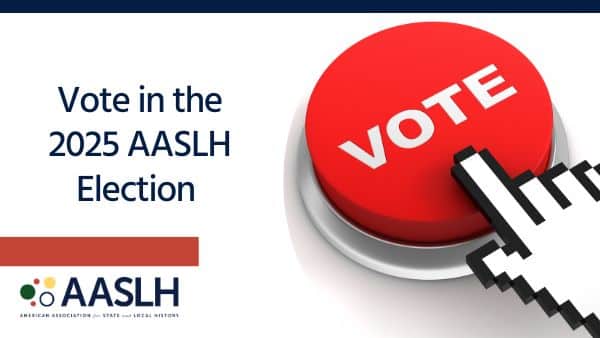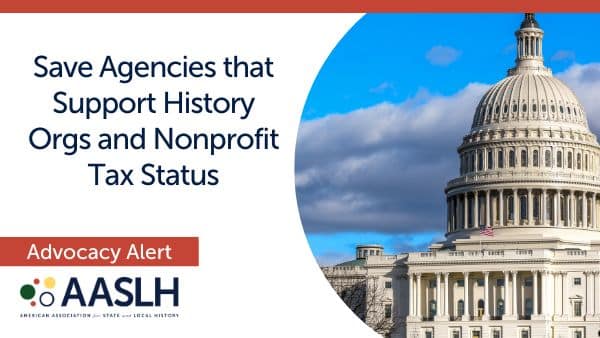Are you interested in the role of environmental sustainability in the museum profession? Do you have ideas or questions about sustainability commitments, or the role of sustainability standards for the field?
PIC Green, AAM’s Professional Network on Environmental Sustainability, is hosting three national web conversations in March 2016. The webinars continue earlier discussions on the potential for commitments or standards on environmental sustainability at museums, zoos, gardens, historic sites and aquariums.
AASLH’s Bob Beatty and Cherie Cook will be presenters on the Tuesday, March 8 webinar session by Association leaders.
For the last three years PIC Green has held Summits on Environmental Sustainability in Museums at AAM’s annual meeting. The first Summit resulted in a white paper, Environmental Sustainability, Museums, and our Future, distributed by AAM. However, these discussions have been limited to attendees at the annual meeting. For AAM to include such standards in the accreditation process, the need and the standard must be articulated by the field, rather than a few voices from the field.
The three webinars shift the discussion from one about “Do we use green building/practice standards?” to one about “What positive difference would it make for the field if we made commitments or set environmental sustainability expectations or standards?”
Possible Outcomes
- Recommend a new standard or standards for sustainability in museum work
- Add a statement on moral responsibility to AAM’s Code of Ethics
- Establish a commitment challenging signatories to set and meet sustainability goals
Format of the Webinars
Each webinar will be 75 minutes long.
For the first 45-55 minutes, presenters will each respond to the following two questions:
- What is your experience with, and view of, standards systems (green or not) or sustainability commitments?
- What effect do you believe these could have on the museum profession?
Listeners will have the last 20-30 minutes to engage the presenters with questions or comments via online chat.
Tuesday, March 1
3:00-4:15pm EST
Institution Directors
Presenters:
- Bill Eiland, Georgia Museum of Art
- Ron Kagan, Detroit Zoo
- Julie K. Stein, Burke Museum
- Nina Zannieri, Paul Revere Memorial Association
Use this WebEx link to add the webinar to your calendar, and to join it a few minutes before it begins.
Meeting number: 737 765 007
Meeting password: museum
To join by phone:
1-650-479-3208 Call-in toll number (US/Canada)
Access code: 737 765 007
Tuesday, March 8
3:00-4:15pm EST
Association Leaders
Presenters:
- Bob Beatty and Cherie Cook, AASLH
- Sarah Beck, APGA
- Tim Carter, Second Nature
- Shelly Grow, AZA
- Tim McNeil, CAM
- Dan Yeager, NEMA
Use this WebEx link to add the webinar to your calendar, and to join it a few minutes before it begins.
Meeting number: 736 646 552
Meeting password: museum
Join by phone
1-650-479-3208 Call-in toll number (US/Canada)
Access code: 736 646 552
Thursday, March 24
3:00-4:15pm EST
Organization Leaders
Presenters:
- James Elder, Campaign for Environmental Literacy
- Johnny Fraser, New Knowledge
- Greg Johnson, Perkins+Will
- Susie Wilkening, Reach Advisors
- Douglas Worts, World Views Consulting
Use this WebEx link to add the webinar to your calendar, and to join it a few minutes before it begins.
Meeting number: 733 619 819
Meeting password: museum
Join by phone
1-650-479-3208 Call-in toll number (US/Canada)
Access code: 733 619 819
How to Participate
We invite museum professionals to listen and ask questions during one or all of the sessions. You may submit questions using the chat feature in the web meeting. Those with a phone only connection may submit questions by email to: [email protected] and [email protected]. We will incorporate questions at the direction of the moderator, Sarah Sutton, and will address as many questions as possible during the 75-minute call. You also may submit questions after the call using these email addresses.
Background About Existing Standards in the Museum Field
The American Association for State and Local History refers to environmental sustainability in its Standards of Excellence Program:
Historic Structures and Landscape Standard 7 [This standard is specific to AASLH] The institution considers and implements sustainable practices of energy conservation in the operations and care of its historic structures and landscapes that are compatible with the site’s mission and preservation policies.
And AASLH uses this indicator for “basic” level of performance for management of structures and facilities: It considers energy efficient systems and other environmentally sustainable features in its design and replacement of systems and buildings.
The Association of Zoos and Aquariums has a Strategic Sustainability Plan how-to document, and is including this requirement for accreditation.
The California Association of Museums has a Green Museum Initiative with a signatory list of museums from around the country, and resources for greening museums.
The American Public Gardens Association has a Sustainability Index and a valuable set of resources.



